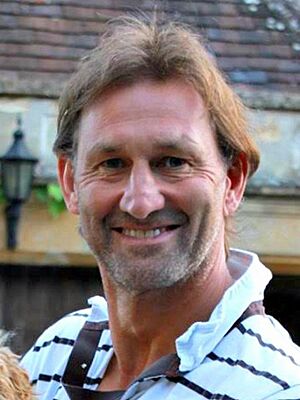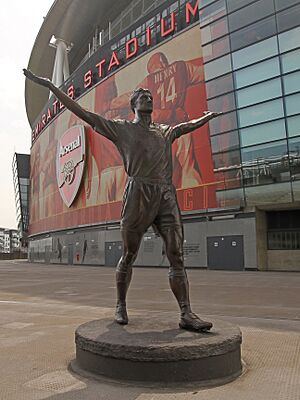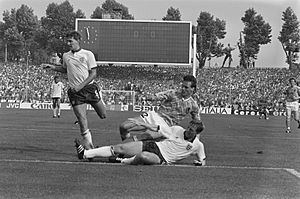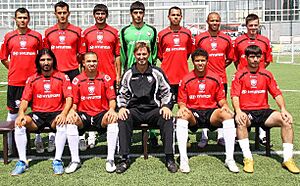Tony Adams facts for kids

Adams in 2017
|
|||
| Personal information | |||
|---|---|---|---|
| Full name | Tony Alexander Adams | ||
| Date of birth | 10 October 1966 | ||
| Place of birth | Romford, London, England | ||
| Height | 6 ft 3 in (1.91 m) | ||
| Position(s) | Centre-back | ||
| Youth career | |||
| 1980–1983 | Arsenal | ||
| Senior career* | |||
| Years | Team | Apps | (Gls) |
| 1983–2002 | Arsenal | 504 | (32) |
| International career | |||
| 1983–1984 | England U17 | 13 | (5) |
| 1985 | England Youth | 1 | (0) |
| 1985–1986 | England U21 | 5 | (1) |
| 1987–2000 | England | 66 | (5) |
| Managerial career | |||
| 2003–2004 | Wycombe Wanderers | ||
| 2008–2009 | Portsmouth | ||
| 2010–2011 | Gabala | ||
| 2017 | Granada | ||
| *Club domestic league appearances and goals | |||
Tony Alexander Adams (born 10 October 1966) is a famous English former football player and manager. He played for Arsenal and the England team. Tony Adams was the captain for both teams. People often called him Mr. Arsenal because he played his whole 19-year career as a centre-back for Arsenal.
He played 672 games for Arsenal and helped them win four English league titles. Many people think he is one of Arsenal's best players ever. He is also part of the Football League 100 Legends. With Arsenal, he won four top league titles. He was the only captain to win a title in three different decades! He also won three FA Cups, two Football League Cups, a UEFA Cup Winners' Cup, and two FA Community Shields.
Tony Adams is one of six people who have a statue outside the Emirates Stadium. This is Arsenal's home stadium. He played 66 games for England between 1987 and 2000. He also played in four big international tournaments. After he stopped playing, Adams became a football manager. He managed teams like Wycombe Wanderers, Portsmouth, Azerbaijani team Gabala, and Spanish team Granada.
Contents
Early Life and Football Start
Tony Adams was born in Romford, England. He grew up in Dagenham. He went to Hunters Hall Primary School and then Eastbrook Comprehensive School. His cousin, Steve MacKenzie, was also a professional footballer.
Tony Adams joined Arsenal as a schoolboy in 1980. He played his first game for the main team on 5 November 1983. He was only 17 years old. In that first game, he accidentally put his shorts on backwards! He also gave the ball away, which led to the other team scoring.
He became a regular player in the 1986–87 season. That year, he won his first big trophy. Arsenal beat Liverpool in the Football League Cup Final at Wembley. On 1 January 1988, he became Arsenal's captain. He was only 21. He stayed captain for the next 14 years until he retired.
Arsenal's Famous Defence
Tony Adams was known for his strong leadership in defence. This helped Arsenal win the League Cup in 1986–87. They also won the First Division championship twice. The first time was in 1988–89. They won after beating Liverpool in the last game of the season. The second time was in 1990–91. They only lost one game all season!
Adams was part of the "famous back four" at Arsenal. This group included Lee Dixon, Nigel Winterburn, and Steve Bould. Under manager George Graham, they were known for their excellent defence. They were very good at using the offside trap. This defence was incredibly strong for over ten years. In the 1990–91 league season, Arsenal only let in 18 goals. The four players played over 2,000 games for the club together.
In 1992–93, Adams was captain when Arsenal won both the League Cup and the FA Cup. This was the first time an English team had done this. In 1994, Adams led Arsenal to win their first European trophy in 24 years. They beat Parma 1–0 in the 1994 European Cup Winners' Cup final in Copenhagen.
Wenger's Arrival and Retirement
Arsène Wenger became Arsenal's manager in October 1996. Tony Adams said that Wenger understood him well. Adams led the team to win two more Premiership and FA Cup Doubles. These were in 1997–98 and 2001–02.
In August 2002, Tony Adams retired from football. His last game was the 2002 FA Cup Final. He played for Arsenal for almost 20 years. He played 674 matches for the club. Only David O'Leary has played more games for Arsenal. Tony Adams was the most successful captain in Arsenal's history. The number 6 shirt he wore was not used again until the 2006–07 season.
Arsenal honored Tony Adams with a special game against Celtic in May 2002. Many Arsenal legends played, including Ian Wright and his "back four" teammates. In 2004, Adams was added to the English Football Hall of Fame. This was to recognize his big impact on English football. In 2008, he was voted third in a poll of the 50 Greatest Gunners on the club's website.
A statue of Tony Adams was put outside Emirates Stadium on 9 December 2011. This was to celebrate the club's 125th anniversary. Other statues there include manager Herbert Chapman and top goal scorer Thierry Henry.
Playing for England
Tony Adams played his first game for England against Spain in 1987. He played in UEFA Euro 1988. England lost all three games, but Adams scored one of England's two goals. This was in a 3-1 loss to the Soviet Union. He was the first player born after England's 1966 World Cup win to play for the national team.
Adams faced some challenges in his international career in the early 1990s. He was not chosen for the 1990 FIFA World Cup team. He missed UEFA Euro 1992 due to an injury. England also did not qualify for the 1994 FIFA World Cup. England reached the semi-finals of UEFA Euro 1996. They lost to Germany in a penalty shootout.
Adams played in the 1998 FIFA World Cup. His last big tournament for England was UEFA Euro 2000. After this, he became captain again. However, he retired from international football soon after. He had played 66 games for England. He was the last England player to score at the old Wembley Stadium. He scored England's second goal in a 2-0 friendly win against Ukraine on 31 May 2000.
Tony Adams is the only England player to play in major tournaments in three different decades.
How Tony Adams Played
Tony Adams played as a centre-back. He was a tall, brave, and strong defender. His best qualities were his leadership, his ability to win headers, and his skill at reading the game. He was also good at timing his tackles. At first, he was not known for being great with the ball. But under manager Arsène Wenger, he improved this part of his game. He became known for carrying the ball out from the back. He was not very fast, though.
Manager and Coach Career
After studying sports science, Tony Adams became the manager of Wycombe Wanderers on 5 November 2003. The team was in last place in the third division. In his first game, they won 4-1. He resigned from Wycombe on 9 November 2004, for personal reasons.
In July 2005, Adams became a trainee coach for the Dutch team Feyenoord. He also worked as a scout for Arsenal, watching games in other countries.
Adams joined Portsmouth as assistant manager in June 2006. In his first season, Portsmouth finished ninth in the Premier League. This was their highest finish since the 1950s. They also won the 2007–08 FA Cup. Adams became the full-time manager of Portsmouth in October 2008. He was in charge for 16 games. He was sacked in February 2009.
In May 2010, Adams signed a three-year contract to manage Azerbaijani club FC Gabala. He left Gabala in November 2011. In October 2012, Adams returned to Gabala as Sporting Director. While working there, he had a heart scare. He had a successful operation that saved his life.
On 10 April 2017, Adams became the manager of Spanish team Granada CF. The team was struggling in La Liga. Granada was relegated from La Liga at the end of the season. Adams lost all seven games as manager and was then sacked.
Life Outside Football
Tony Adams has five children from two marriages. He married Jane Shea in 1992, and they had two children. They divorced in 1997. He married Poppy Teacher in 2004, and they have three children.
In September 2000, Adams started the Sporting Chance Clinic. This is a charity that helps sportspeople with their mental health. Famous people like Elton John support this charity. The money from Adams's testimonial match in 2002 also went to this foundation.
During the COVID-19 pandemic, Adams started Six Mental Health Solutions (SIX MHS). This group helps businesses provide mental health services to their employees. He also supports other charities like The Forward Trust and Saving Faces.
In December 2018, Tony Adams became the President of the Rugby Football League. He was later succeeded by Clare Balding. In 2022, Adams was a contestant on the TV show Strictly Come Dancing. He finished ninth after having to leave due to an injury.
Honours

Arsenal
- Football League First Division: 1988–89, 1990–91
- Premier League: 1997–98, 2001–02
- FA Cup: 1992–93, 1997–98, 2001–02; runner-up: 2000–01
- Football League Cup: 1986–87, 1992–93; runner-up: 1987–88
- FA Charity Shield: 1991 (shared), 1998
- Football League Centenary Trophy: 1988
- European Cup Winners' Cup: 1993–94
- UEFA Cup runner-up: 1999–2000
- European Super Cup runner-up: 1994
Individual Awards
- English Football Hall of Fame: 2004
- Premier League Hall of Fame: 2023
- Football League 100 Legends
- PFA Young Player of the Year: 1986–87
- PFA First Division/Premier League Team of the Year: 1986–87, 1993–94, 1995–96, 1996–97
- Ballon d'Or Nominated: 1998
- Premier League 10 Seasons Awards: (1992–93 to 2001–02)
- Domestic Team of the Decade
- Overall Team of the Decade
- Premier League 20 Seasons Awards: (1992–93 to 2011–12)
- Public choice Fantasy Teams of the 20 Seasons
- Panel choice Fantasy Teams of the 20 Seasons
- FWA Tribute Award: 2002–03
- Arsenal Player of the Season: 1986−87, 1989−90, 1993−94
Orders
Images for kids
See also
 In Spanish: Tony Adams (futbolista) para niños
In Spanish: Tony Adams (futbolista) para niños
 | Delilah Pierce |
 | Gordon Parks |
 | Augusta Savage |
 | Charles Ethan Porter |







